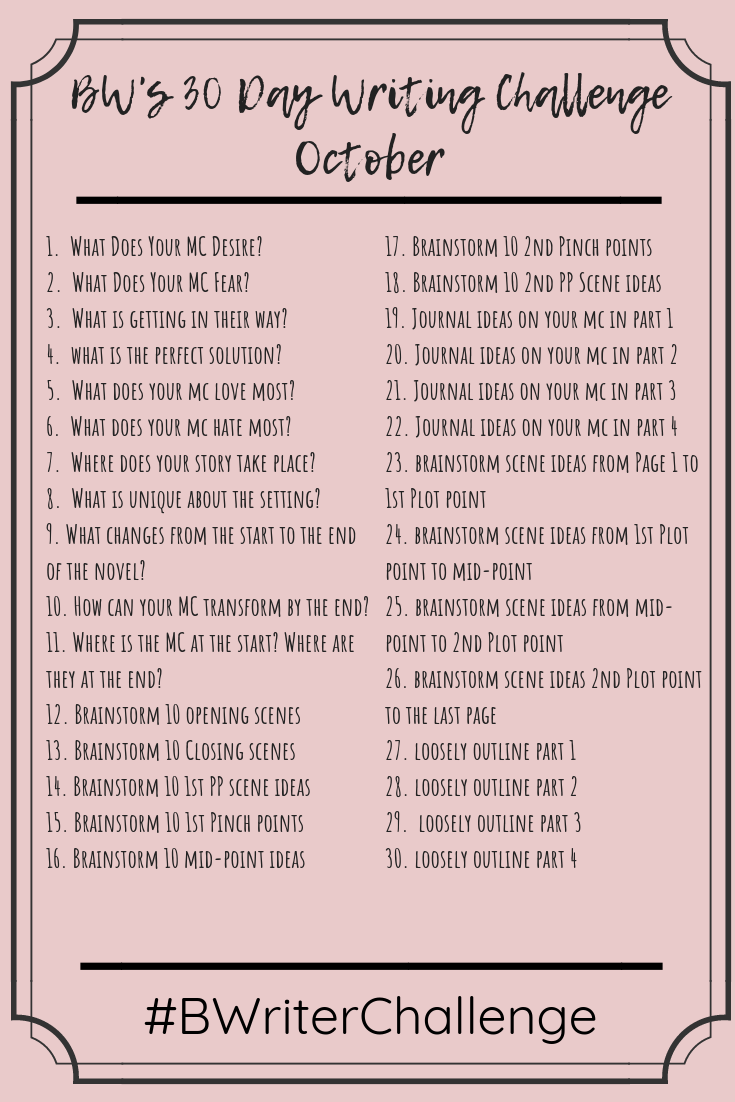
This is a mix of what I’ve learnt from Larry Brooks and Robert McKee, which may help you to quickly prepare for NaNoWriMo or writing a novel in a month or rather 50,000 words.
The following list of prompts is to help guide you into finding your story and helping you to create a scene list that you can work with during November.
Remember, it’s action scenes which will help you successfully navigate NaNoWriMo and writing a novel quickly.
For more information check out this series from Larry Brooks on story structure, or his Story Engineering or Story Physics books.
This page contains affiliate or referral links, which means I receive a small commission if you decide to click through and buy anything. This is at no extra cost to you, but helps me maintain this website ? If you want to know more, please read our Affiliate Disclosure. Links on this site may lead to products for which the site owner may receive compensation.
30 NaNoWriMo Prompts for October

Character Questions – ask your Main Character (and/or Antagonist):
1. What do you truly desire?
2. What do you truly fear?
3. What is getting in your way?
4. What would be the perfect solution/ending for this situation for you?
5. Who or what do you love most in the world?
6. Who or what do you hate most in the world?
Setting Questions:
7. Where does, or could your story take place?
8. What is unique about this place?
Story Questions:
9. What changes between the start and the end of the novel?
10. How could your MC transform by the end?
11. Where does your MC start the story? And where are they at the end?
Story Structure Scene Ideas:
This list should give you ideas for scenes, and scenes with action are what you want while powering through NaNoWriMo.
12. Brainstorm at least 10 ideas for an opening scene.
13. Brainstorm at least 10 ideas for the closing scene.
14. Brainstorm 10 ideas for the First Plot Point, the moment your MC starts on the real story (sometimes called the Inciting Incident).
15. Brainstorm at least 10 ideas for First Pinch Point.
16. Brainstorm at least 10 ideas for the Mid-Point.
17. Brainstorm at least 10 Ideas for the Second Pinch Point
18. Brainstorm at least 10 ideas for 2nd Plot Point.
19. Journal your ideas, images, thoughts on your MC in Part 1; the Orphan, in the Set-Up Stage of the novel.
20. Journal your ideas, images, thoughts on your MC in Part 2, the Wanderer, in the Response Stage of the novel.
21. Journal your ideas, images, thoughts on your MC in Part 3, the Warrior, in the Active/Attack Stage of your novel.
22. Journal your ideas, images, thoughts on your MC in Part 4, the Martyr, in the Resolution Stage of your novel.
23. Brainstorm scene ideas, to take you from Page 1 to the First Plot Point at the end of Part 1.
24. Brainstorm scene ideas to take you from First Plot Point to the Mid-Point, at the end of Part 2.
25. Brainstorm scene ideas to take you from the Mid-Point to 2nd Plot Point, at the end of Part 3.
26. Brainstorm scene ideas to take you from the 2nd Plot Point to the final, closing scene of the novel.
27. Create a loose outline/plot points of Part 1.
28. Create a loose outline/plot points of Part 2.
29. Create a loose outline/plot points of Part 3.
30. Create a loose outline/plot points of Part 4.
Remember these two resources here for more information on the plot points and pinch points, and Parts of a Novel.
Conclusion
This list should help you get prepared for NaNoWriMo. But remember it isn’t the end of the world if you cannot complete NaNoWriMo this year. If you want to write a novel, then make a plan to write your novel, but in a timeframe that suits You.
I myself, like making small changes each day which add up to a whole lot over a period of time. Why not use NaNoWriMo to start your novel, but commit instead to a daily 300 words, 5 days a week? Perhaps this would better suit your workload and schedule?
300 words a week with the weekend off is 6000 words a month; which is 72,000 a year. That’s a decent length novel each year. Or if you want to produce more; double your 300 and write 600 words a day, which is 2 novels per year; or 900 words a day, which is 3 x 72k novels per year. When you put less pressure on yourself, (but still a little pressure:) ) you’ll be amazed at what you can accomplish.
I’d recommend checking out Holly Lisle’s How To Write A Novel class. It’s a brand new class, so at a super low introduction price right now, and will help guide you into writing your novel step-by-step week-by-week over a period of 8 months.
This class will give you a method that’s reusable (and much faster the subsequent times) and will get you a novel that you love and that your readers will love.
And if you grab it now, at the intro price, you’ll receive a Matt Edit at an 80% discount. That’s a full novel developmental edit (for under 100k words).
Check out the class HERE, or sign up here for Holly’s Free Flash Fiction Class, to get a feel for her writing and teaching style.
I’d love to hear what you think of this list, and how your #preptober is going for NaNoWriMo 2018. Let me know in the comments and I’ll get back to you as soon as I can.
Happy Writing!
Erica


Wow I never knew that such a platform existed, to help you in writing a novel. It is actually one of those things that is tucked away at the back of my mind, as I love to write. But writing a novel is truly daunting, especially for someone who has never done it before. I’ll take some time to explore NaNoWriMo and see whether I get the courage to do it. Thanks for this!
Thanks for reading, Joo – I’m glad you liked the post:) NaNoWriMo can be fun, but it’s good not to get too disheartened if don’t actually “win” it. I think any regular writing is great practice – it helps in the end:)
Erica,This is very good. I wish I had these questions before me when I was first writing my novel. A few years ago, I wrote (novelized) my experience in dealing with my Dad, an Alzheimer’s patient who wasn’t known to be one, at the time of my mother’s death (at the time, it wasn’t clear if we were dealing with his ongoing grief issues, or alcoholism or what). Prodigal Father hasn’t been published for long–just a few months, now–but it was a cathartic experience that has helped me to put yesterday behind. I wish I would have your story-structure ideas before me, ten years ago, when I was writing my story. Thanks for the post. I look forward to reading more from you.
Hi Kevin, thank you so much for your response:) Thank you for sharing your experience with your writing. I have also found writing to be rather therapeutic at times.
I’m glad you liked the post:)
Erica
it has always been my Dream to write a Novel, and reading this Was very exciting for me, but I need to know where to start from first, is this NaNowriMo like a Journal where you write? I looked at the 30 steps of writing and I started seeing my story..Lol
I will also check Holly Lisle and see if she has what I am looking for, and since I do love writing alot, I feel I wont Have difficulties finding to what to write about. But can fiction be right for wanting to write my own life story?
Apologies for the extremely late reply 🙁 Did you find out more about Nanowrimo? It’s actually a month-long challenge in November.
In regards to writing your own story, maybe a memoir writing class might be better?